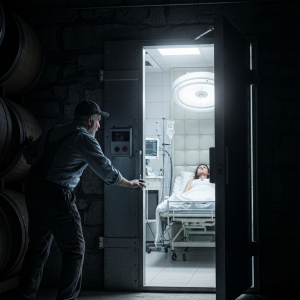The scent of lavender and old books—the scent of our home—was the last thing I remembered before the world became a sterile, white blur. For ten years, Julian had been my world. We had built a life together, or so I thought, in the sprawling house my parents had left me, a sanctuary of inherited memories and quiet wealth. He was charming, ambitious, and, I believed, utterly devoted. My only flaw, in his eyes, was my “fragile emotional state,” a narrative he had spent years carefully constructing, brick by insidious brick.
It began subtly, like a slow poison. Misplaced keys would reappear in my coat pocket after I’d spent an hour in a frantic search. “You’re getting so forgetful, darling,” he’d say with a gentle, concerned smile, his voice like velvet wrapping around a stone. Important appointments he swore he never told me about would lead to missed opportunities and apologies I had to make on his behalf. He would whisper to our friends about my “anxiety” and “mood swings,” always framing it as the loving concern of a long-suffering husband. He was an artist, and my sanity was his canvas, each stroke of doubt a masterpiece of manipulation.
The public unveiling of his work came during our annual charity gala, an event I used to adore. He had spent the week before making small, cutting remarks—about my choice of dress (“A bit drab, isn’t it, Elara?”), my speech (“Are you sure you’re up for it? You’ve been so on edge.”), my contributions (“Let me handle the details, love. You just focus on looking pretty.”). By the time we arrived, I was a bundle of nerves, second-guessing every word and gesture.
It was there he introduced me to Isabelle Worthington, the daughter of a business magnate whose company he was desperate to merge with. She was polished, cold, her smile a perfect, geometric shape that never reached her eyes. She looked at me with an unnerving, clinical pity, as if I were a patient she was observing. Julian spent the evening at her side, a study in charismatic ambition, leaving me to drift through the crowd, feeling increasingly isolated and invisible.
When I finally approached him, my voice trembling with a mix of hurt and frustration, he turned my private pain into a public spectacle. “Elara, darling, please,” he said, his voice loud enough for the nearby clusters of guests to turn and stare. “Not here. Let’s not make a scene. You know how you get when you’re overwhelmed.” He put a firm arm around me, a gesture that looked protective to outsiders but felt like a cage to me. Isabelle looked on, her expression one of perfect, rehearsed sympathy. The trap was sprung, and I was the only one who felt its teeth.
That night, he sat on the edge of our bed, his face a mask of profound sorrow. He held my hands, his touch now feeling alien. “I think you need a break, my love,” he said, his voice a soothing lullaby of deceit. “A place to rest. A wellness retreat. I’ve found a wonderful place, secluded and peaceful. Just for a few weeks, to get your strength back. I can’t bear to see you like this.” I was so exhausted from his years of psychological warfare, so convinced of my own brokenness, that I agreed. I believed I was a fractured thing, and he was the only one who knew how to piece me back together.
The “wellness retreat” was a private sanitarium called “Serene Meadows,” a gilded prison where the wealthy sent their inconvenient family members to disappear. My phone was taken for a “digital detox.” My room was plush, but the windows were made of reinforced polycarbonate. The staff were polite, but their eyes were vacant, their kindness a well-rehearsed script. My “therapy” consisted of heavy sedatives that left me in a thick, disorienting fog.
Julian was my only approved visitor. He would come once a week, bearing flowers and lies. He’d tell me how much everyone missed me but how they all agreed this was for the best, that I was making “such progress.” He was my jailer, disguised as my savior, and I was too drugged to see the bars.
For two months, I lived in that haze, my sense of self eroding with each passing day. The turning point came not from a dramatic escape, but from a quiet act of defiance, a spark of the old Elara refusing to be extinguished. I started faking taking my medication, hiding the little white pills under my tongue and disposing of them later. As the chemical fog began to clear from my mind, so did the truth of my situation. The inconsistencies, the manipulations, the pitying looks from Isabelle at the gala—it all clicked into place with horrifying, stark clarity. Julian wasn’t trying to heal me. He was erasing me.
But I was trapped. I had no access to the outside world, no way to prove my sanity to people who were paid to believe I had none. My salvation came from a name I hadn’t thought of in over a decade: Marcus Thorne, my mother’s estranged brother. He was a phantom from my childhood, a self-made billionaire who had built an empire from nothing. He was ruthless, brilliant, and had a major falling out with my parents years ago over their more passive approach to business and life. I only had a single, vivid memory of him at my parents’ funeral, pressing a sleek, black business card into my hand. “If you ever really need anything,” he had said, his eyes sharp and assessing, “call this number. Not for a loan. For a war.”
With the help of a sympathetic night nurse, a young woman named Lena who saw the flicker of life in my eyes that others ignored, I made one phone call. I paid her with the diamond earrings I had been wearing—the last gift from my parents.
Marcus arrived the next day. He didn’t come with flowers or comforting words; he came with a team of stone-faced lawyers who dismantled the sanitarium’s legal standing in under an hour with threats of lawsuits that would bankrupt them twice over. As I walked out into the bright sunlight, feeling its warmth on my skin for the first time in months, Marcus handed me a tablet. He didn’t hug me. He didn’t ask if I was okay.
“Welcome back, Elara,” he said, his voice devoid of sentiment. “Now, let’s get you up to speed on what your husband has been doing while you were ‘unwell’.”
The screen was a timeline of my life’s demolition. Julian had systematically transferred assets from my inheritance into high-risk ventures connected to the Worthington family empire. He had used my “illness” to grant himself power of attorney, leveraging my fortune to secure the merger he craved. And the final, sickening cherry on top: a digital wedding invitation, elegant and understated, announcing the union of Julian Thorne and Isabelle Worthington. The date was in two weeks. The venue was the Worthington’s lavish country estate.
“He’s not just replacing you,” Marcus said, his tone grim as he scrolled through the financial reports. “He’s using your own money to do it. He’s paying for his wedding to another woman with the fortune your parents left you, a fortune he plans to fully control once you’re declared permanently incompetent.”
A cold, clean fury washed over me, burning away the last vestiges of the broken woman Julian had tried to create. “He thinks I’m locked away, sedated and silent,” I said, my voice steady, devoid of the tremor it had held for years.
Marcus raised a single, questioning eyebrow. “And what are you?”
“I’m getting ready for a wedding,” I replied.
The next two weeks were a masterclass in calculated action. Marcus’s team of forensic accountants worked in the shadows, gathering every piece of financial data, every illegal transfer, every ounce of damning proof. We discovered Julian hadn’t just used my money; he had committed wire fraud, creating shell corporations to inflate his own company’s value to impress Isabelle’s father. He wasn’t just a heartless husband; he was a common criminal whose ambition had made him sloppy.
While the lawyers built the case, Marcus helped me rebuild myself. There was no coddling. He didn’t offer therapy; he offered strategy. He took me to a shooting range to steady my hands and my resolve. He sat with me in a boardroom for hours, teaching me the intricacies of the corporate empire my parents had left me, an empire I had foolishly allowed Julian to manage. He introduced me to a tailor who dressed me not in the soft, pleasing clothes Julian preferred, but in armor of silk and steel. I was not just recovering; I was re-arming.
On the day of the wedding, I did not feel a single tremor of anxiety. I sat in the passenger seat of a gleaming silver Aston Martin, a car that cost more than the house Julian was so desperate to keep. Marcus drove, looking impassive in a tailored suit. In my lap was a single, elegantly wrapped gift box from Asprey, tied with a dark green ribbon.
We arrived at the Worthington estate just as the music began to swell. The grounds were swarming with the city’s elite, a testament to the power Julian thought he was marrying into. We didn’t use the main entrance. Marcus had arranged for us to drive directly onto the manicured lawn, the tires of the supercar barely whispering on the perfect grass as we stopped just short of the outdoor ceremony. The purr of the engine was the only sound that cut through the string quartet.
Every head turned. The music faltered. Julian and Isabelle, standing at the altar under a cascade of white roses, looked over in annoyance, an expression that slowly morphed into pure, unadulterated shock. Julian’s face went white.
The car door opened. I stepped out, wearing a custom-made suit in a shade of emerald green so vivid it seemed to hum with energy. My hair was styled in a sharp, elegant cut. I was not the fragile, weeping wife he had sent away. I was a queen arriving to reclaim her kingdom.
I walked down the aisle, not towards the altar, but parallel to it, my heels sinking slightly into the perfect grass. The guests parted before me like the Red Sea. I stopped at the front row, directly in front of Isabelle’s father, a man whose stony expression never wavered, even as his eyes darted from me to the ashen face of his daughter’s fiancé.
The officiant, a flustered man in his fifties, tried to continue. “If… if anyone has any reason why these two should not be joined in matrimony…”
“Oh, don’t let me interrupt,” I said, my voice carrying clearly in the stunned silence, amplified by a small microphone Marcus’s security had discreetly placed nearby. “I’m not here to object. In fact, I’m here to offer a wedding gift.”
I held up the beautiful box. A young assistant of Marcus’s, perfectly cued, took it from me and presented it to Julian. His hands trembled as he fumbled with the ribbon and lifted the lid.
Inside were two items, nestled on a bed of black velvet.
The first was a set of beautifully bound, leather-clad documents. “That,” I announced, my voice ringing with cold precision, “is a full and final accounting of the Thorne Family Trust—the one my parents left to me. The trust that, until this morning, was the sole funding source for your company, Julian. As of 9 a.m. today, that trust was dissolved. All assets, shares, and properties have been reclaimed by their rightful owner. The checks you’ve written to pay for all of this…”—I gestured vaguely at the lavish wedding, the orchestra, the hundreds of guests—”…will not be honored. In short, your company is a hollow shell, and you are bankrupt.”
A collective gasp rippled through the crowd. Julian stared at the papers, his face crumbling as the reality of his ruin settled upon him.
“But don’t worry,” I continued, turning my gaze to the impassive face of Isabelle’s father. “I have a gift for you as well.”
The second item in the box was a slim, unassuming flash drive made of brushed steel. “On that drive, Mr. Worthington, you will find a detailed dossier of Julian’s… creative accounting. Shell corporations, fraudulent reports to inflate his value, evidence of embezzlement. It seems he was so desperate to appear worthy of your daughter that he built his entire career on a foundation of lies. He’s not an asset to your empire. He’s a liability. And a criminal one at that.”
Isabelle took a single, sharp step away from Julian, as if he were contaminated. Her face was a mask of cold fury and utter disgust. Her father looked from the flash drive to Julian, and in his eyes, I saw not anger, but the quiet, final click of a massive steel door being locked and bolted forever. Julian was no longer a person to him; he was a bad investment being liquidated.
“I believe my work here is done,” I said. I looked at Julian one last time, a man I once loved, now just a hollowed-out shell of ambition and greed, his borrowed world collapsing around him. “You wanted my world, Julian. You can have what’s left of it.”
I turned and walked back to the car, my steps measured and even, never once looking back. As the Aston Martin pulled away with a soft crunch of tires on grass, I could see the chaos erupting in the rearview mirror. Isabelle was in a heated, low-toned argument with her father. Guests were rising from their seats, whispering furiously. The wedding was over. His life as he knew it was over.
“So,” Marcus said, his eyes on the road ahead. “What’s next?”
I looked out at the open road, the sun warm on my face. “A new beginning,” I said. And for the first time in a very, very long time, I felt completely, utterly free.
A week after the ruined wedding, the headlines had begun to fade, but the consequences rippled outward like shockwaves across glass. Julian’s name was blacklisted in every corporate circle that mattered. Investigations were underway, subpoenas issued. Isabelle’s father quietly issued a statement dissolving any prior business affiliations with the Thorne Group and its “former executive.” Julian had disappeared from the public eye. Rumor had it he’d fled the country, though some said he was holed up in a hotel downtown, drowning in scotch and lawsuits.
I didn’t care.
The house was mine again.
Not the house I once shared with him, but the home my parents left me—the one he’d tried to turn into a cage. I had it gutted. I stripped every inch of it of his fingerprints. The curated minimalist decor he once loved was replaced with deep jewel tones, old wood, velvet curtains, and the scent of lavender once more. It was no longer a showroom for appearances. It was warm again. Real.
And in the library, untouched for years, I found something that made me pause—a letter from my mother, tucked into an old volume of poetry. It must’ve been hidden for decades. In her careful handwriting, it said:
“For my Elara—
This house is not just bricks and books. It’s our memory. Our strength. If ever the world makes you doubt who you are, come back here. Let the silence remind you of your voice.”
I cried for the first time—not from fear, or despair, but from the relief of finally hearing her, even if only through paper and ink. Her voice had never truly left me. It had simply been buried beneath Julian’s noise.
Marcus visited often, though he never stayed long. He wasn’t one for sentiment. But one afternoon, as we sat on the porch sipping dark roast coffee, he looked over and said, “You’re stronger than your parents ever gave you credit for.”
I smiled, brushing a strand of hair behind my ear. “Or maybe they knew I’d figure it out eventually.”
He nodded. “You have options now. Run the company. Sell it. Start fresh. Whatever you want.”
I took a breath, feeling the weightless clarity of freedom. “I think I’ll take a year off. Travel. Breathe. Maybe open an art gallery somewhere small and quiet.”
He raised his cup to me. “To Elara 2.0.”
Months passed. Seasons shifted.
I stood at the shoreline in Cinque Terre one dusky evening, sketchbook in hand, watching the waves kiss the rocks. No one knew my name here. No one whispered about my “fragile mental health” or the scandalous wedding takedown. Here, I was just a woman with a sketchpad and a suitcase.
And that was enough.
In the final page of my sketchbook, I wrote:
“He tried to erase me.
But I remembered.
And in remembering,
I became whole.”




